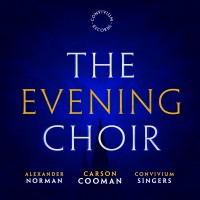Opus 959
The Evening Choir (2012)
for SATB Chorus, SATB Soloists, Organ
Text by Jones Very
Harvard University Choir; Edward Elwyn Jones, conductor
Duration: 11 min.
Dedication: in memoriam Peter J. Gomes (1942–2011)
Commission: Commissioned by The Memorial Church, Harvard University
 Recorded on The Evening Choir: Sacred Choral Music by Carson Cooman (2014)
Recorded on The Evening Choir: Sacred Choral Music by Carson Cooman (2014)Publisher: Zimbel Press/Subito Music Corp.
Performance materials available from the publisher.
The Evening Choir (2012) for chorus, soloists, and organ was commissioned by The Memorial Church at Harvard University to celebrate the dedication of the C. B. Fisk organ, Op. 139: the Charles B. Fisk and Peter J. Gomes Memorial Organ. The work is dedicated in memory of Peter J. Gomes (1942–2011), for whose personal support and encouragement I will be forever grateful.
The text is an extended poem by Jones Very (1813–1880), a mystical figure associated with the American Transcendentalism movement. A graduate of Harvard University (1846) and Harvard Divinity School, Very produced a large body work in a personal style that was much appreciated and praised by his Transcendentalist colleagues. Much like the English poet Christopher Smart, Very suffered from issues of mental health and religious delusions (believing at times he was the Second Coming of Christ), and was institutionalized for a number of years. Upon his release, he was helped in the publication of his work particularly by Ralph Waldo Emerson (who believed strongly in Very’s sanity—“Such a mind cannot be lost,” Emerson wrote). Very spent most of the remainder of his life as a recluse under the care of his sister, and in the last 40 years of his life produced little work and made almost no public appearances due to crippling shyness. Though some of his poems were published in his lifetime, the vast majority were only circulated privately among the Transcendentalists. Though Very’s work was highly regarded by his contemporaries, it was only with the publication of Helen R. Deese’s critical edition of his complete poems (862 of them) in 1993 that his achievements have been more broadly acknowledged and praised by the wider community of scholars and poetry lovers.
“The Evening Choir” was one of the poems published during Very’s lifetime under Emerson’s direction. After its publication in the journal The Dial, Very was disturbed to see that Emerson had made various editorial changes and wrote to him saying: “I found my poem ‘The Evening Choir’ altered considerably from what I had written—I do not know but in one or two cases for the better. Perhaps they were all improvements but I preferred my own lines. I do not know but I ought to submit to such changes as done by the rightful authority of an Editor but I felt a little sad at the aspect of the piece.” Unfortunately, no manuscript copy of this poem survives, so Emerson’s edited version is what must be used.
The poem is set as a cantata—involving choir, four soloists, and prominent use of the organ. Given the dramatic nature of the text, the work is rather more austere and apocalyptic than most of my choral music to date. I sought to create a musical analogue to the blazingly vivid sound of Very’s verse.
